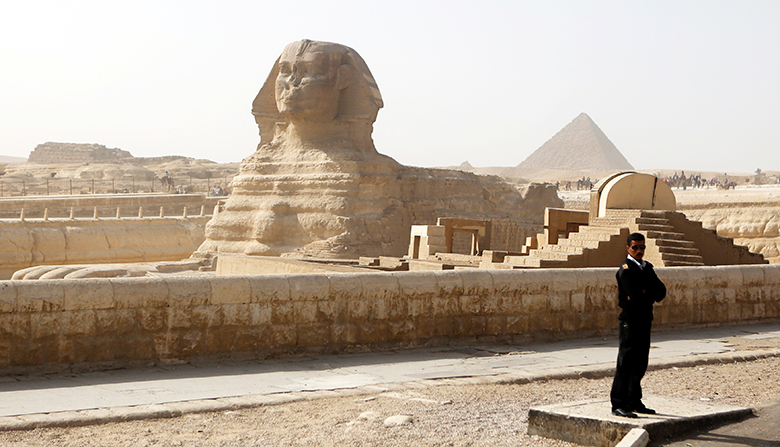Guarding the guardian: Egypt’s tourist numbers are on the rise, thanks in part to tighter security
In January, Euromoney Country Risk (ECR) flagged up Egypt as a higher-risk option with improving fortunes, offering an alternative to safer prospects Morocco and Tunisia, just as Fitch placed its sovereign borrower B rating on a positive outlook.
Since then, Egypt’s risk score has continued to rise and, in August, Moody’s put its B3 rating on a positive outlook, signalling two of the three agencies are poised for an upgrade, with Standard & Poor’s maintaining a stable B rating.
On a score of 37.8 from 100 points, Egypt has since moved up into the fourth of five risk categories in Euromoney’s survey to 98th out of 186 countries in the global risk rankings, arguably calling for those credit-rating upgrades.
It has seen the biggest rise in risk score so far in 2018, ahead of other big improvers such as Slovenia, Cote d’Ivoire, Moldova and Greece, and is now out of the ‘default danger zone’ as the government goes in search of more foreign borrowing, notably in Asia, to supplement multilateral creditor loans.
Gaining from floating the currency and improving global trade, all five of Egypt’s economic risk indicators have been upgraded this year, alongside four of the six political indicators – notably government stability – and two structural indicators concerning hard and soft infrastructure.
Above all, Egypt has seen one of the biggest improvements in its capital-access score since gaining support in 2016 from the IMF in the form of a three-year extended fund facility worth $12 billion.
The financing programme passed a fourth review in October, releasing another $2 billion of financing, and culminating in total disbursements of $10 billion to date.
The country is still a high-risk option, with the economy vulnerable to deteriorating global trade and insecurity, with an undercurrent of anti-government sentiment to watch out for, but most risk indicators have improved.
In its latest report, the IMF notes GDP growth has accelerated from 4.2% in the fiscal year 2016/17 (to end June) to 5.3% in 2017/18 – the highest in a decade.
With plans to issue a Eurobond before end-2018 or early 2019, and a sukuk in 2019-20, the authorities will probably remain well-behaved, by and large
– Rafiq Raji, Macroafricaintel
The government is predicting it will rise to 5.5% in 2018/19, and is ambitiously targeting 10% growth for 10 years’ time, according to Hala Helmy El Said, the minister of planning.
Rafiq Raji, an ECR survey contributor and chief economist at Macroafricaintel, agrees there has been a number of recent positive developments, mentioning the IMF disbursement and additional financing from the World Bank and international banks.
Few are anticipating a return to the Arab Spring revolt, and on political moves Raji says: “President Abdel Fattah el-Sisi has indicated he desires a smaller cabinet, cutting the size of the civil service, while just recently a critic of the government was released from jail.
“With plans to issue a Eurobond before end-2018 or early 2019, and a sukuk in 2019-20, the authorities will probably remain well-behaved, by and large.”
The IMF, meanwhile, notes the current-account deficit has narrowed from 5.6% of GDP in 2016/17 to 2.4% in 2017/18, the debt burden has declined from 103% to 93% of GDP through fiscal consolidation led by fuel subsidy reforms and improving tax revenue, which is targeting a primary surplus of 2% of GDP.
Unemployment is down below 10%, easing strains on the public finances and social-instability risks, assisted by dedicated programmes creating job opportunities for graduates, providing microfinancing for women and improving incomes of civil servants.
Flagged
Marwan Barakat, ECR expert and Bank Audi Group’s head of research, has flagged the recent country report on Egypt from the Institute of International Finance in his team’s latest research, noting these improving indicators as well as core inflation falling to single digits.
Monetary policy is anchoring inflation expectations and “has contained the second-round effects from the pound depreciation and the increase in fuel and electricity prices”, the report states.
The medium-term outlook remains uncertain, but based on recovery in tourism and rising natural-gas production, “the growth outlook for the next two years is favourable”, the report continues, and foreign-exchange reserves have risen to $42.5 billion, providing 6.5 months of imports cover.
Tourism minister Rania Al-Mashat is pleased with the improvement in visitor numbers, stating the sector will contribute more than 15% of GDP this year, assisted by better security, improved marketing and a cheaper Egyptian pound.
This is despite the suspicious deaths of two British tourists in Hurghada in August, and the lack of flights to Sharm el-Sheikh since the bombing in 2015 restricting British and Russian visitors.
The rise in Suez Canal revenue is another crucial element – up 11.5% in 2017/18 to a record $5.6 billion – and through several reforms, including a new public procurement law, the investment climate has improved, bolstering Egypt’s ranking in the World Bank’s guide to Doing Business 2019.
All in all, Egypt is in a stronger position to withstand volatility in global capital flows and if its progress continues it could become safer than many more tier-four options.


 Signal2forex.com - Best Forex robots and signals
Signal2forex.com - Best Forex robots and signals




